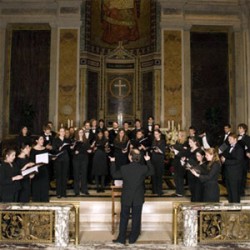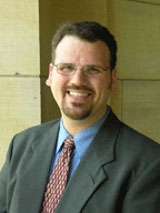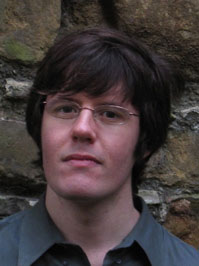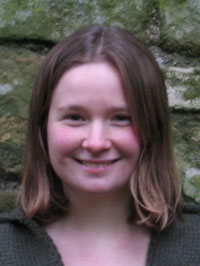by Mike Telin

The Collegium will celebrate this milestone in a two-day reunion on February 19 & 20 culminating in a free performance on Saturday evening at 8 pm in Warner Concert Hall. Some sixty Collegium alumni will gather to sing a program of renaissance music, and Plank has taken advantage of this large group of singers to open and close the concert with one of the most spectacular pieces in the 16th century repertory: Thomas Tallis’ forty part motet for eight choirs of five voices each. This mammoth piece will be sung both in its Latin (‘Spem in Alium’) and English forms (‘Sing and Glorify’).
Dr. Plank has had a remarkable influence on his students over the years. Here are interviews with three alumni who will be joining the reunion chorus this weekend.
Charles McGuire
Charles McGuire is associate professor of musicology at the Oberlin Conservatory.

Charles McGuire: Yes, it’s funny in that Steve really turned me down the path that I have been walking since undergraduate school. It was partially his class, music history 301, which is the introduction to research and writing class, which made me realize that this is something I could do and that I liked doing.
MT: Were you a vocal major?
CM: No I was a trombone major, but I really liked early music a lot, and during Steve’s first year of conducting the Collegium I started really getting into early music and singing a lot more, so it was just kind of a natural fit. I would go and sing as much as I could. I was in the group off and on from, I think, 1989 until I graduated in 1992. I can’t remember exactly, but it was his first year as the director. It was a pretty phenomenal experience as you can imagine, especially because at that time nobody really new him on campus as a conductor except for a very few performance practice people. Everyone knew him as a music history professor, and so we only saw a very specific side of him, one that was very intellectual yet very witty at the same time. Although we knew he was someone who cared a great deal about music, we were able to see him as a maker and shaper of an interpretation rather then just a discusser of music. This was something of a revelation. It is an interesting model to try and follow, and a lot if his students have actually gone on to do both — to be a scholar as well as a performer. It’s a very impressive thing to be able to do.
So I would say the experiences I had in the Collegium had a profound effect as I went on to graduate school. During grad school I sang in a mercenary choir for a few years, so having sung all of that complicated polyphony put me in good stead when I was singing in a daily choir where I was doing an awful lot of sight reading. It influenced my own research. I fell in love with choral music so much under Steve’s baton that I ended-up doing my dissertation on Elgar’s oratorios. Centuries removed from what Steve was doing, yet, if I had not had that great and positive experience with choral music I would have never gone in that direction.
MT: Do you have a particular piece you are looking forward to performing this weekend?
CM: Well, they are all going to be fun, but Spem in alium is such an amazing piece, and we will have enough people that we can have more then one person on a part, so it is going to be an incredible experience. I have only sung it with just barely enough people to cover the parts. It is such a great experience to hear it live rather then just on a recording with all of the antiphonal effects, so people will be in for a real treat.
MT: Do you have any special remembrance you would like to share?
CM: I have so many strong and visceral memories of so many things that we did. For instance, we did Schütz’s Deutsches Magnificat a8, and we did it from the balcony in Fairchild looking down over the pews. Collegium was small enough at that point that we could do that. It’s much bigger today. What I do remember is the sense of anticipation before the concert. We all felt like race-horses just waiting to start. So Steve decided that he was going to play a little Praetorius organ prelude, as he called it, which actually turned out to be a very long and complicated Praetorius prelude, So Steve just kind of sat down, stretched out his hands and started to play and we were all waiting and eager to start singing the Schütz. I also remember that we did some Notre Dame polyphony on one concert. You have the long drones underneath, and you have the people singing the solo parts that are dancing on top in two or three parts. And that was one of the images that Steve was trying to put into our heads, that if you were singing the top part, you really needed to kind of flow, or swim or, as he kept saying, dance. I remember looking back at the choir and they were all kind of rocking back and forth very deliberately, and I almost got sea-sick because they were waving back and forth so steadily. It was a wonderful visual image.
Chris Macklin
Chris Macklin is assistant professor of music history/musicology at Mercer University’s Townsend School of Music in Macon, GA.

Chris Macklin: The entire Collegium experience, and then the experience of singing in Uncloistered have had a particular effect on my personal directions professionally. One of the reasons I went to Oberlin was to be able to participate in music at a very high level without necessarily studying it as your major. I was actually a neuroscience and psychology major, but I started singing in the choirs, and I got involved in a baroque opera project. I started to sing even more when I realized there was this group, the Collegium, that did this pre-baroque music. So I joined the group just to enjoy the music. I always thought that singing would be the avocation and that the vocation would be elsewhere in the sciences. What was always nice about the way the Steven Plank organized it was that he would use whatever vocal resources we had, and during the time that I was there the group was getting fairly large, so we were doing things like Carver’s O bone Jesu, the 38 voice piece. But then there would also be small ensemble things for a cappella group or with continuo. So we got a chance to sing in small groups, and I realized there were some really fantastic people to sing with, so we thought that it would be fun to use the January winter term to be able to sing in a small ensemble. It’s funny because I think as we continued to sing, our musical interests got earlier and earlier and eventually we were singing Hildegard. When Mary [Larew, see next interview] found this program at York at first we didn’t think we would ever get in, and even if we did, it wouldn’t really happen. But it did. So for me, the science thing didn’t work out, but I was eventually able to study with John Potter full time, and I finished a Ph.D. and I now teach music history. So I would say that the Collegium was a pivotal experience in my life
MT: It says in you biography that one of your interests is music pertaining to the Black Death. Can you tell me a little more about this?
CM: Yes, well its very easy to find examples of the black death motives in visual art and literature, but when it comes to music, people seem to have remained silent. When you go forward into the 19th century, people do begin to talk about death in music and more and more as time moves forward, up to things like the musical Rent. So I thought there was a major gap in medieval cultural life. Why is it not discussed in the music?
MT: Is there a particular piece you are looking forward to singing on the reunion concert?
CM: Its kind of a toss up but Spem in alium I am really looking forward to, The last time I performed it was with the Tallis Scholars at a music festival in Brighton (U.K.). I have never done it in the U.S. and I think it will be really fun. Pieces like that are not only a sonic experience, but a physical one as well with all the sound bouncing around. Also, Uncloistered is doing Walter Lambe’s Nesciens Mater from the Eton Choir Book. I am really looking forward to singing it with those guys. So it’s a toss up — do you go for the small scale or to you go for the bold sonic?
MT: Do you have any special remembrance that you would like to share?
CM: Well for me it was stepping into the Collegium at the very beginning. I hadn’t really sung a lot and it was my first semester, and it was the first time I ever sang in a small ensemble. We were doing Robert Wylkynson’s Salve Regina from the Eton Choir Book, and at the very first rehearsal it was like “Oh my goodness!” I was always warned against pursuing a music career because it is hard to make a living, and the only reason to do it was if you realize you couldn’t go a day without doing it, and then and only then should you pursue music, and when I was introduced to the Wylkynson, I said, I actually could do this everyday. Yes, that was the big moment for me. I also remembering Steven Plank say, and I think it was about this piece, “If you can’t count the beats of the angel wings there’s not enough incense” Which I think means you need to create the massive sonority.
Mary Larew
Mary Larew has just completed her Ph.D. in the direction of early music dramas at the University of York (UK).

Mary Larew: The Collegium was a life changing experience for me, because I didn’t really know anything about Renaissance music before I sang in that choir. I didn’t even exactly know what I was auditioning for. But when I was singing with the group it was one of my favorite things to do, and I sort of started thinking, secretly at first, that I would like to do nothing more then to sing this music for the rest of my life. Then I realized that I could try to make that a reality. Uncloisted came about because a couple of us really wanted to explore this music more, and we wanted to try to make it more of a chamber music type of experience. So the five of us started rehearsing weekly, and Steven Plank gave us weekly coachings. We actually registered as a chamber ensemble for credit for a semester, and he was very encouraging and supportive. When I was thinking about what I could do with my life after I graduated, I was looking around on the internet and I found this program that is a masters degree in ensemble singing at the University of York. There is no other program like it in the world as far as I know. Yale has started something similar, but they audition people in order to form a new octet. At York you can bring your own ensemble. This sounded perfect to me because I thought I would like to sing with Uncloistered forever. At first everyone thought I was crazy because we are five very different people and everyone was not sure if that was what they really wanted to do after graduating, but one by one they all said yes, that is what we want to do, so we all moved over and spent a year singing together several hours everyday. We had wonderful opportunities to perform. We were coached primarily by John Potter, formerly of the Hilliard Ensemble, and Anna Maria Friman of Trio Mediaeval. They are wonderful people as well as coaches, just like Steven Plank, so we were very lucky to have these wonderful musicians to guide us.
Physically we are all over the place right now, although we finally have all relocated back to the US. The bass is a professor in Macon Georgia, the tenor is an organist who is doing a DMA at Eastman, the countertenor is about to start an organic orchard in Maine, and the other soprano is a freelance musician in New York city, and I’m living in Iowa this year trying to figure out what is next for me. We are so excited to have this opportunity to come together again in Oberlin because before this performance it has always taken several international flights to get to the same place at the same time.
MT: You were a composition student while as Oberlin. Who was your primary teacher?
ML: Lewis Nielson.
MT: Did singing in the Collegium influence your own compositions?
ML: It had a big influence, I wrote an extensive piece, the one I am most proud of, for Uncloistered and gamba consort. I think the vocal writing that I did in this piece was strongly influenced by the Eton Choir Book, which I would have never encountered had it not been for the Collegium. We sang Wylkynson’s Salve Regina, a nine voice piece that just blew my mind, it was one of the most beautiful things I had ever heard. So I would definitely say that my compositions are strongly influenced by Renaissance polyphony. I also just finished my Ph.D. in the direction of medieval dramas.
MT: You have also sung with Ciaramella, and I am wondering if you were in school at the same time as Debra Nagy?
ML: Yes I was, and in fact I used to stand right next to Debra in the Collegium.
MT: Is there any particular piece you are looking forward to performing this weekend?
ML: I can’t imagine that anyone would say anything other then Spem in Alium. I am really excited about that. I always said I want to have that sung at my wedding or my funeral, which ever comes first, but I guess the reunion came first, which is even better.
MT: Uncloistered will also be performing during the weekend?
ML: It will actually be part of the concert, and we’ll be singing two pieces, one is from the Eton Choir book, Nesciens Mater, by Lambe. It is a relatively short piece, and for the Eton Choir book, very subdued, but it is one of the most beautiful pieces that I have encountered. We just sort of looked at it on a whim, when we were all living in England, and we all just fell in love with it. And now we program it whenever we possibly can. It is so appropriate to sing it on the Reunion concert because we discovered the Eton Choir book with Steven Plank, but then again this is a piece that we found after Oberlin on our continued journey. We will also be singing Orlando Gibbons’ The Silver Swan, which we discovered in Oberlin when we first formed Uncloistered. Steven Plank gave us coachings on it, so it will be a very sentimental thing for us to sing it because we always think of Oberlin and Steven’s coachings.
MT: Do you have a particular remembrance you would like to share?
ML: What I really remember it as, was that time of the week when everything else was going on, and no matter how stressful things were, Collegium was always just a time of peace, reflection and beautiful singing. I don’t think anything made me happier during my entire time at Oberlin, It was just a wonderful experience.



